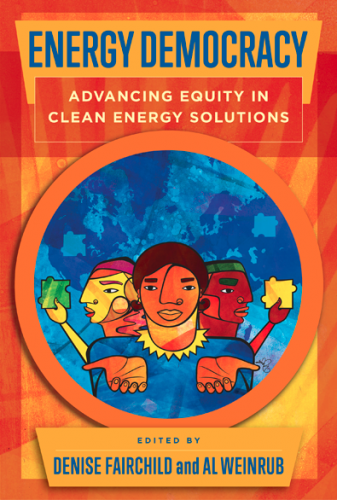A global energy war is underway. It is man versus nature, fossil fuel versus clean energy, the haves versus the have-nots, and, fundamentally, an extractive economy versus a regenerative economy. The near-unanimous consensus among climate scientists is that the massive burning of gas, oil, and coal is having a cataclysmic impact on our atmosphere and climate, and depleting earth’s natural resources, including its land, food, fresh water and biodiversity.
These climate and environmental impacts are particularly magnified and debilitating for low-income communities and communities of color that live closest to toxic sites, are disproportionately impacted by high incidences of asthma, cancer and rates of morbidity and mortality, and lack the financial resources to build resilience to climate change.
Purchase Energy Democracy: Advancing Equity in Clean Energy Solutions
Energy democracy tenders a response and joins the environmental and climate movements with broader movements for social and economic change. Energy democracy is a way to frame the international struggle of working people, low income communities, and communities of color to take control of energy resources from the energy establishment and use those resources to empower their communities—literally providing energy, economically, and politically. Energy democracy is more important than ever as climate and social justice advocates confront a shocking political reality in the U.S.
This volume brings together racial, cultural, and generational perspectives. This diversity is bound together by a common operating frame: that the global fight to save the planet—to conserve and restore our natural resources to be life-sustaining—must fully engage community residents and must change the larger economy to be sustainable, democratic, and just. The contributors offer their perspectives and approaches to climate and clean energy from rural Mississippi, to the South Bronx, to Californian immigrant and refugee communities, to urban and semi-rural communities in the Northeast. Taken together, the contributions in this book show what an alternative, democratized energy future can look like, and will inspire others to take up the struggle to build the energy democracy movement.
Table of Contents
Chapter 1. Introduction by Denise Fairchild and Al Weinrub
Chapter 2. From Commodification to the Commons: Charting the Pathway for Energy Democracy by Cecilia Martinez
Chapter 3. The Case for a Just Transition by Michelle Mascarenhas-Swan
Chapter 4. Energy Democracy Through Local Energy Equity by Strela Cervas and Anthony Giancatarino
Chapter 5. Base-Building and Leadership Development for Energy Democracy: APEN’s Work in East Bay Asian Immigrant and Refugee Communities by Vivian Yi Huang and Miya Yoshitani
Chapter 6. Organizing for Energy Democracy in Rural Electric Cooperatives by Derrick Johnson and Ashura Lewis
Chapter 7. Conflicting Agendas: Energy Democracy and the Labor Movement by Sean Sweeney
Chapter 8. Democratizing Municipal-Scale Power by Al Weinrub
Chapter 9. Community-Anchor Strategies for Energy Democracy by Maggie Tishman
Chapter 10. New Economy Energy Cooperatives Bring Power to the People by Lynn Benander, Diego Angarita Horowitz, and Isaac Baker
Chapter 11. Building Power Through Community-Based Project Development by Anya Schoolman and Ben Delman
Chapter 12. Conclusion: Building an Energy Democracy Movement by Denise Fairchild
Format





